10 May 2022
A study that explored the attitudes of vaccine hesitant adults in the UK towards uptake of the COVID-19 vaccine found that participants were hesitant rather than opposed to the vaccine. They had questions about their need for, and the safety and efficacy of the vaccine. Concerns were exacerbated by a lack of trust in government and misunderstanding of science, the University of Bristol-led study found.

Researchers interviewed 35 people aged between 18 and 29 who had not had the vaccine, and 35 people aged between 30 and 49 who had not had the second dose of the vaccine after 12 weeks, to understand what the barriers to vaccination were and what facilitated uptake.
Although hesitant about receiving a first or second dose of a COVID-19 vaccine, the majority of participants did not consider themselves to be anti-vaccine, and were usually able to recognise the possible benefits of being vaccinated for themselves and those around them.
Younger people did not consider themselves to be at risk of becoming ill from COVID-19, did not think the vaccination was effective in preventing transmission, and did not think sufficient research had been done regarding possible long-term side-effects.
Safety concerns were frequently mentioned by participants who had not received a first or second vaccine dose, with many describing a range of side-effects they or friends and family had experienced, or that they had been exposed to through the media.
A small number of participants reported being unable to book or attend an appointment for a first or second dose with the ease that would be required.
Financial incentives and vaccine passes to encourage uptake were mostly considered ‘wrong’, with participants describing them as coercion, blackmail or bribery (financial incentives) or forcing people to be vaccinated against their will (vaccine passes). Both were felt likely to increase public mistrust.
Dr Sarah Denford, Research Fellow at the NIHR Health Protection Research Unit in Behavioural Science and Evaluation at University of Bristol and lead author of the study said: “What we found is that, overall, participants were not opposed to taking the COVID-19 vaccine but that they had a number of concerns, which can be viewed as barriers to uptake. Most people we spoke to were actively engaged in weighing up the relative risks and benefits. It was concerns around safety, efficacy and trust in government and science that acted as barriers and contributed to their hesitancy.
“To promote uptake, public health campaigns should focus on the provision of information from trusted sources that explains the benefits of vaccination and addresses safety concerns more effectively. Where people’s motivation levels to be vaccinated are low, appointments must be easily accessible.”
Despite initial hesitancy among some groups, more than 53 million people in the UK (over 92 per cent of the population) have received the COVID-19 vaccine since the rollout began in December 2020. Of these, more than 39 million people (over 68 per cent of the population) have received at least three doses. Reports of serious side effects are extremely rare, and vaccination is considered to be the single most effective way to reduce deaths and severe illness from COVID-19. (Source: UK Health Security Agency)
Paper: Exploration of attitudes regarding uptake of COVID‑19 vaccines among vaccine hesitant adults in the UK: a qualitative analysis by Sarah Denford, Fiona Mowbray, Lauren Towler, Helena Wehling, Gemma Lasseter, Richard Amlôt, Isabel Oliver, Lucy Yardley and Matthew Hickman BMC Infectious Diseases [open access]
Further information
About the NIHR Health Protection Research Unit [HPRU] in Behavioural Science and Evaluation at the University of Bristol
The NIHR HPRU in Behavioural Science and Evaluation at University of Bristol is one of 14 HPRUs across England, part of a £58.7 million investment by the NIHR to protect the health of the nation.
The NIHR HPRU in Behavioural Science and Evaluation is a partnership between the UK Health Security Agency (UKHSA) and University of Bristol, in collaboration with MRC Biostatistics Research Unit at the University of Cambridge and University of the West of England.
Each NIHR HPRU undertakes high quality research that is used by UKHSA to keep the public safe from current and emerging public health threats.
About the NIHR
The National Institute for Health and Care Research (NIHR) is the nation’s largest funder of health and care research. The NIHR:
- funds, supports and delivers high quality research that benefits the NHS, public health and social care
- engages and involves patients, carers and the public in order to improve the reach, quality and impact of research
- attracts, trains and supports the best researchers to tackle the complex health and care challenges of the future
- invests in world-class infrastructure and a skilled delivery workforce to translate discoveries into improved treatments and services
- partners with other public funders, charities and industry to maximise the value of research to patients and the economy.
The NIHR was established in 2006 to improve the health and wealth of the nation through research, and is funded by the Department of Health and Social Care. In addition to its national role, the NIHR supports applied health research for the direct and primary benefit of people in low- and middle-income countries, using UK aid from the UK government.